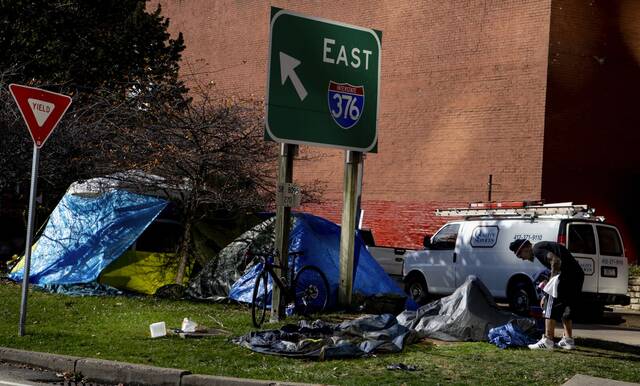https://triblive.com/opinion/ria-sharma-fiscally-responsible-solutions-for-the-unhoused/
Ria Sharma: Fiscally responsible solutions for the unhoused

Imagine you’re presented with two options as an investor. Option one: Spend $50,000 annually to trap a homeless person in a cycle of incarceration, poverty and repeated release into the streets. Option two: Spend $15,000 annually to lift someone out of homelessness, reduce crime, lower emergency service costs and restore human dignity. Which would you choose?
The 2024 U.S. Supreme Court decision in Johnson v. City of Grants Pass made it easier for municipalities to criminalize homelessness by allowing ordinances that penalize public camping, even when no shelter beds are available. Framed as a public safety solution, these policies offer the appearance of governmental action to solve the homelessness problem. In reality, however, criminalizing homelessness exacerbates it at taxpayer expense.
Homelessness directly affects more than 650,000 individuals in the United States, according to the U.S. Department of Housing and Urban Development’s 2023 Point-in-Time Count.
In Pennsylvania alone, more than 12,000 people are currently unhoused.
The economic costs are staggering. Incarcerating one individual can run between $30,000 and $50,000 per year. When combined with emergency health care, policing and temporary shelter costs, the total annual expense per unhoused person can exceed $60,000 annually. Despite these expenses, nearly half of unhoused individuals cycle back through the criminal justice system frequently, creating an endless loop that benefits no one.
This isn’t just a humanitarian crisis. It’s a financial disaster.
Contrast this with permanent supportive housing, which costs only $10,000 to $15,000 per person annually. Programs like Housing First in Salt Lake City and Los Angeles have reduced homelessness by more than 80%, while saving up to $30,000 per individual each year.
That’s not an act of charity. It’s smart investing.
The economics alone tell us that there must be a shift from punishment to prevention. Here are the best approaches:
• Housing-first approach: This approach provides immediate access to permanent housing without preconditions, allowing individuals to stabilize and pursue recovery or employment. These programs save taxpayers approximately $30,000 per person annually.
• Low-income housing: Such housing options increase access to affordable, stable living and, in turn, stable housing increases employment rates by 20% to 25% and delivers between $1.40 and $2.70 in economic return for every dollar invested.
• Outpatient treatment programs: Treatment programs for mental health and addiction recovery tackle some of the root causes of homelessness. Costing between $5,000 and $10,000 annually per person, these offerings reduce hospitalizations, arrests and incarceration rates.
• Diversion programs: These alternatives to incarceration provide community service or treatment options in place of incarceration for minor non-violent offenses and, which in turn can reduce the criminalization of poverty and help individuals reintegrate into society. Diversion initiatives can reduce recidivism by between 50% and 70%, with costs as low as $1,000 per person, compared to the $30,000 to $50,000 per person per year for incarceration.
• Food security: Food banks and other nutrition services assist people in getting back on their feet. Food program access for unhoused individuals reduces annual health care costs by $1,500.
These approaches demonstrate that, rather than funding a costly, short-sighted tactic that further harms the vulnerable, wisely investing taxpayer resources in solutions that yield long-term benefits and create savings over time is a far better policy approach.
Taxpayers deserve solutions that aren’t only effective but also grounded in fiscal responsibility.
We possess the data and models necessary to guide our policy decisions. The time has come to cultivate the political resolve required to move away from performative policies that yield surface-level satisfaction and, instead, invest in well-researched strategies that deliver real, lasting change.
Ria Sharma graduated from Penn State University this year with a degree in pre-medicine and a minor in bioethics and medical humanities.
Copyright ©2026— Trib Total Media, LLC (TribLIVE.com)
